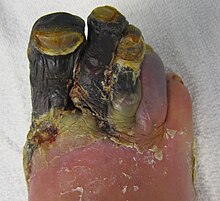User:Mr. Ibrahem/Gangrene
| Gangrene | |
|---|---|
| Other names | Gangrenous necrosis |
 | |
| Dry gangrene affecting the toes as a result of peripheral artery disease | |
| Specialty | Infectious disease, surgery |
| Symptoms | Change in skin color to red or black, numbness, pain, skin breakdown, coolness[1] |
| Complications | Sepsis, amputation[1][2] |
| Types | Dry, wet, gas, internal, necrotizing fasciitis[3] |
| Risk factors | Diabetes, peripheral arterial disease, smoking, major trauma, alcoholism, HIV/AIDS, frostbite, Raynaud's syndrome[3][4] |
| Treatment | Surgery, antibiotics[5] |
| Frequency | Unknown[2] |
Gangrene is a type of tissue death caused by a lack of blood supply.[4] Symptoms may include a change in skin color to red or black, numbness, swelling, pain, skin breakdown, and coolness.[1] The feet and hands are most commonly affected.[1] Certain types may present with a fever or sepsis.[1]
Risk factors include diabetes, peripheral arterial disease, smoking, major trauma, alcoholism, HIV/AIDS, frostbite, and Raynaud's syndrome.[3][4] It can be classified as dry gangrene, wet gangrene, gas gangrene, internal gangrene, and necrotizing fasciitis.[3] The diagnosis of gangrene is based on symptoms and supported by tests such as medical imaging.[6]
Treatment may involve surgery to remove the dead tissue, antibiotics to treat any infection, and efforts to address the underlying cause.[5] Surgical efforts may include debridement, amputation, or the use of maggot therapy.[5] Efforts to treat the underlying cause may include bypass surgery or angioplasty.[5] In certain cases, hyperbaric oxygen therapy may be useful.[5] How commonly the condition occurs is unknown.[2]
References[edit]
- ^ a b c d e "Gangrene Symptoms". NHS. 13 October 2015. Archived from the original on 12 December 2017. Retrieved 12 December 2017.
- ^ a b c "Gangrene". patient.info. 12 March 2014. Archived from the original on 12 December 2017. Retrieved 12 December 2017.
- ^ a b c d "Gangrene Causes". NHS. 13 October 2015. Archived from the original on 12 December 2017. Retrieved 12 December 2017.
- ^ a b c "Gangrene". NHS. 13 October 2015. Archived from the original on 7 March 2018. Retrieved 12 December 2017.
- ^ a b c d e "Gangrene Treatment". NHS. Archived from the original on 12 December 2017. Retrieved 12 December 2017.
- ^ "Gangrene Diagnosis". NHS. 13 October 2015. Archived from the original on 12 December 2017. Retrieved 12 December 2017.
